One of the nice things about living a seamless Jewish life is no more Christmas angst. The key is staying out of malls or planning to make a day of it. (A friend and I were reminded of this when we made the innocent decision to see The Hobbit at The Grove. Could not believe the parking or the saccharine music piped just a little too loud. But the tree and the lights were like a second Rivendell.)
Generally, though, what’s not to like? Most of us get a paid holiday from work with no religious restrictions to observe. There is, of course, the traditional movie and Chinese food (or Greek, as Greek Orthodox Christmas is weeks away). There are service opportunities at homeless shelters throughout the city—of course that’s true every day, isn’t it?
Most people are in pretty decent moods. Our city of neon gets even more shiny than usual. And people who wish one a merry Christmas are, for the most part, just being nice, not aggressively evangelical.
For the most part. There are those who make a public stink about anyone who broadens the greeting to “happy holidays,” and who propagate the ‘war on Christmas’ meme. This bespeaks a refusal of pluralism and a desire to re-vision the United States as a Christian country that only ‘tolerates’ others who graciously accept their place.
What is wrong with acknowledging the scope and breadth of the holiness and joy at this time of year? Why not be sensitive to the mood of this season as it begins to build?
First we have a coming to terms with the gathering night. Yom Kippur, Day of the Dead, Halloween/Samhain all invite us to conceive of November as a time when the veil between worlds thins, when we take stock of ourselves and our frailties and remember our beloved dead. The last two holidays especially invite us to consider the uncanny, to face our fears with humor as well as respect.
Other holidays overlap. Solstice, Diwali, Hanukah and Kwanzaa are all observed with candles and light, the promise of renewal after winter, the assurance that seeds grow in the dark. Hanukah and Kwanzaa both celebrate cultural pride and are signs of its flourishing. Eid Al-Adha and Christmas both celebrate the willingness to sacrifice and the rebirth of hope. All the religious holidays celebrate the miraculous, the gift of meaning.
Joy upon joy, holiness upon holiness. Why not be sensitive to the varied flavors of uplift and revelation that the season brings in our fabulous world city? Why not wish everyone “happy holidays,” instead of assuming that we know what holiday they observe at home?
The more grounded in my own tradition I am, the easier it is for me to take pleasure in the joy of others. I see no reason to appropriate Christmas as an ‘American holiday’ or a secular holiday. I attend the parties of my Christian friends because I love them. I don’t sing Christmas carols, because I don’t believe that the obscure rabbi Yehoshua ben Yosef, one of the thousands of Jews tortured to death by the Roman Empire, was ever a Christ, let alone resurrected, and I see no reason to disrespect a tradition by trivializing it as a harmless (because meaningless) bit of popular myth.
This reminds me—I have learned, not only to stay out of malls, but also to be very selective about TV. Once you’ve seen It’s a Wonderful Life twice, enough is enough. It’s easy to avoid the movies and Peanuts special, but then there are those Very Special Episodes.
Did you enjoy this article?
You'll love our roundtable.
Editor's Picks



What Ever Happened to the LA Times?

Who Are the Jews On Joe Biden’s Cabinet?


No Labels: The Group Fighting for the Political Center
Latest Articles



Echad Mi Yodea? Who Knows One?

The First Alphabet and the Third Plague

A Bisl Torah – The Fifth Child












 More news and opinions than at a Shabbat dinner, right in your inbox.
More news and opinions than at a Shabbat dinner, right in your inbox.